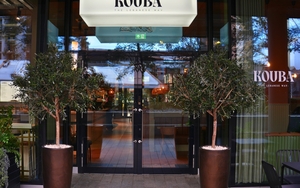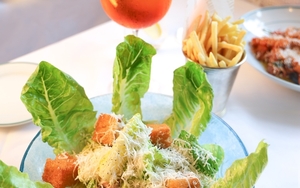How Mana is handling the post-Michelin media circus
Two days after Michelin gave Manchester its first star in over four decades, Mana was a world away from its usual oasis of calmness and tranquility. Phones were ringing, chairs were pushed back into one corner and camera equipment was strewn across the restaurant.
A delivery van pulled up outside and a driver wandered in holding a box of flowers. They’d been sent by Tom Kerridge, himself no stranger to Michelin success.
I would have been about £150,000 in debt without having anything to show for it if I hadn’t have found the backers
At the centre of this circus stood chef Simon Martin, doing a good job of processing what was happening, whilst communicating how he was feeling about it.
We had tried asking Simon for his Michelin predictions last week, but he was keeping his cards very close to his chest. He didn’t want to jinx it. We even stalked his social media feed to see if he was in London, but he wasn’t giving anything away.
So when did you actually find out Mana had been awarded the Michelin star?
SM – “We’d got an invite to the awards ceremony on the Friday before. They don’t actually say ‘you’ve got a star,’ so you don’t know. It could have been for one of the other awards they give out at the beginning. I was naturally a little bit doubtful, because it’s something that I’ve wanted for the last 15 years, not just since I opened this restaurant. I wanted to be in that club. I was very nervous when I got on stage. You only know when it comes up on the screen.”
Have you been surprised by the response?
SM – “My phone kept buzzing in my pocket and within an hour I must have had about over a thousand messages. It hasn’t stopped. I haven’t even read all the articles. I did radio this morning and when someone asked me who it was for, I said I didn’t even know.”
Everyone wants a piece of him. Even the BBC had got carried away, exaggerating a moment regarding a brief unsettled period when Simon was trying to find somewhere to live during his internship at NOMA in Copenhagen, by twisting it into a ‘former homeless chef, rags to riches story.’

How are you coping with this crazy media circus?
SM - "I’m knackered to be honest. I’m just really looking forward to getting back into the kitchen. That’s where I’m happiest, when I’m cooking."
So now you have one Michelin star, are you under even more pressure to keep it?
SM – “We’ve only got better since we opened. We’re going to continue on that path and that’s it. As long as we’re trying to be better every day, then we shouldn’t have anything to worry about. The food we were serving last week, I believe, is even better than the food that’s been inspected by Michelin.”
Why do you think Mana succeeded in Manchester - a notoriously tough nut to crack - where others haven’t?
SM - "Probably our structure and the fact we only serve 25 guests. We’re a brand new facility and we’ve always had all the tools to do it. We weren’t trying to open too much. We made it easy for ourselves because we want a restaurant where we can thrive and do the best possible job."
Made it easy?
SM – “Don’t get me wrong; we all work extremely hard, but in terms of having the tools, the amount of guests and the opening hours. We make the whole menu fresh every day but most restaurants have a three-day rule where you can blanch a langoustine on a Wednesday for Friday’s service. I didn’t want that.”
Are you always watching out for single diners, wondering whether they’re the Michelin inspector?
SM – “These days a lot of people feel comfortable dining on their own, especially in places like this where you’ve got the open kitchen to watch, so we do get quite a few single diners. So if you turn up on your own, looking serious, with a pair of glasses strategically placed at the end of your nose, it’s not necessarily going to get you better treatment.
"We don’t change things for people. Everybody gets the same treatment and the same service. If you start making new rules up if you’re suspicious of somebody being a reviewer or a blogger, you just add chaos. Some restaurants might have something special they can whip out of the bag in case an inspector comes in, but that just makes things complicated."
What do you think Michelin look for?
SM – “I don’t know why people say they don’t know, because Michelin lay out their criteria; good produce, personality of the chef in the food, good quality cooking etc. Michelin is about the food. It’s not even about the service, décor or anything like that."
Is that why a Michelin star has always meant something to you?
SM – “Yes. It’s the one guide I trust. I’m not being biased just because I’ve got it now. I’ve never been to a bad Michelin restaurant. The inspectors are from within the industry and, from what I understand, the training programme is very long and intense. They know their stuff. They’re not just someone that eats food while watching Jamie Oliver on the telly.
"I don’t go to a solicitor and tell him how to do his job just because I’ve watched an episode of Law and Order. So nine times out of 10 if I’m happy with what I’m cooking and serving, then other people should love it too."
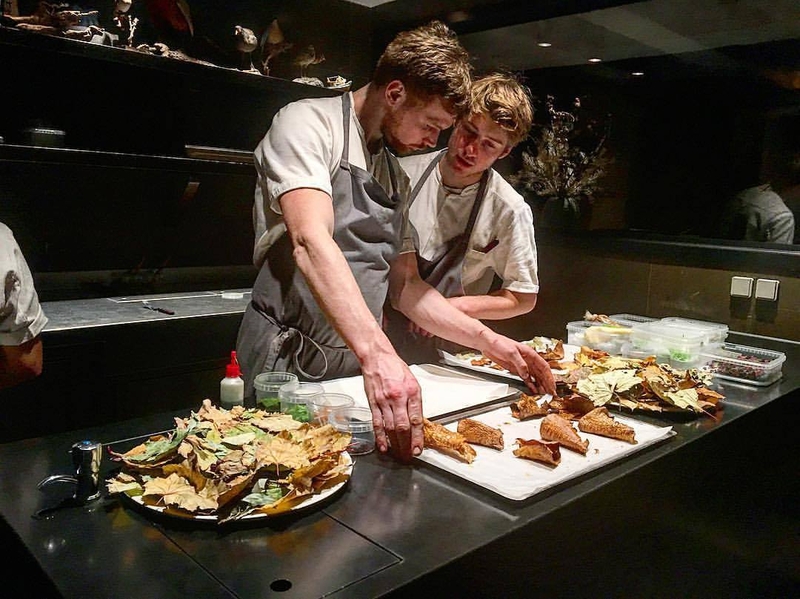
What do you know about the inspection process?
SM – “For any sort of promotion or inclusion in the guide, I think it’s a minimum of three or four inspections. It’s anonymous. The only visit I knew of is when one of the inspectors came back the following day for a chat. They need to make sure that the inspections that they do this year will still be represented the next year. So they have to be very sure of any award that they give. Ultimately the fact that they go to these lengths is what makes it such an amazing guide.
“No one from The Good Food Guide came in to have a chat with me to find out what we were all about and there’s no guarantee they did more than one inspection.”
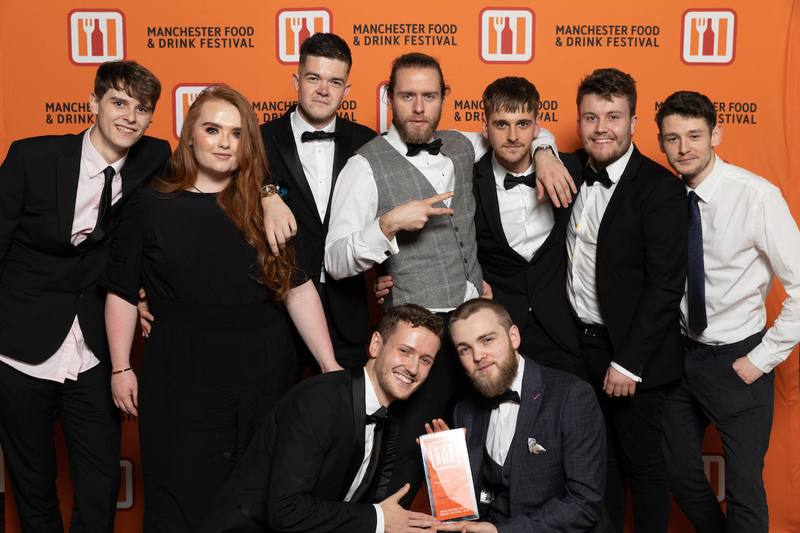
It’s unlikely you’re going to have trouble attracting staff now, what advice would you give someone who wants to work for you?
SM – “First of all be passionate about the food, but I also want them to be self-disciplined, organised, work hard and have a good personality. You know, be a nice person and respect your colleagues.”
The story is that you didn’t originally want to be a chef and your dad went and got you a job at the Chester Grosvenor. So were those all the qualities you possessed at the time?
SM – “Absolutely not. I had a really rubbish work ethic. I wasn’t organised.”
What sacrifices have you made to get this star? Tell us the bits people cant see?
SM – “It’s a lot of work. A lot of thought processes. Michelin don’t put pressure on people to get stars, we put the pressure on ourselves and life with a restaurant needs to be sustainable like anything else. You can’t just be sacrificing things all the time. People say they’ve sacrificed relationships and their wellbeing and mental heath, but there’s no point in living such an unhealthy life where everything is about attaining that star.
“Twice a month the team get three days off in a row so they have time off to rest and recover because Wednesday to Saturday is a short space of time and within that I want the best out of everybody.”
Do you ever have time to go and eat at other Michelin starred places?
SM – “Well I’ve eaten at Moor Hall five times (laughs) so I do, yes. I have days off too, its important to lead by example. If I’m pissed off and tired all the time with no time to even see my girlfriend, I’ll be in a shit mood and I’ll put my staff in a shit mood so I need to recover as well.”
Places like L’Enclume or Moor Hall grow a lot of their own produce. Aren’t you a bit hamstrung by being based within a big city?
SM – “Just because the restaurant is growing produce in their own kitchen gardens doesn’t mean that it’s better, it just means they’re in control of it and they can grow what they want. We have a good relationship with our suppliers, we tell them what we’d like and they grow it for us. Why are we arguing with people who have been growing vegetables for years when we’re just cooks?”
How do you think having a Michelin star will change in terms of business?
SM – “After Marina’s review we filled up, but eventually I’m sure that might have died off eventually, so this has just carried it on.”
Have you had a chance to look at the books to see the difference it’s made?
SM – “There are three people on it now where there was only one before. We open 120 days in advance so if people really want to get a table they can. We still get no shows, which has a massive impact on the business, but other than that, it’s been very busy anyway."
Do you think you might be under pressure to open an extra day just to keep up?
SM – “We are going to do that anyway just because we’re confident enough now and we feel like we want to share what we’ve accomplished with people. We’ve been doing lunch on Saturdays for a while, we’re just going to be opening for lunch on Thursdays and Fridays – but we don’t do the full menu at lunch.”
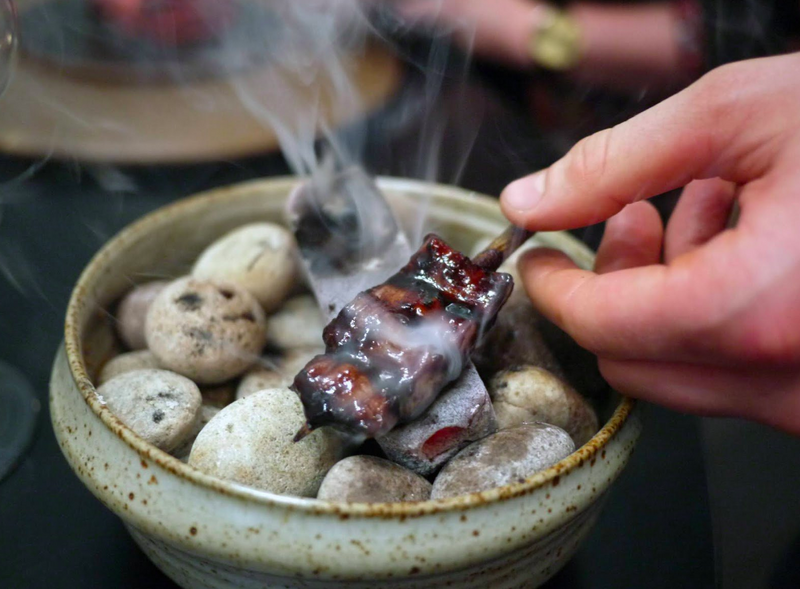
It’s very close to Mana's first anniversary (they opened the doors on 17th October 2018) how did this restaurant come about?
SM – “I’d already made a logo and created a social media account. Then I asked my friend (Anthony Barnes) if he knew of any empty units in Manchester, because he had a restaurant in Ancoats (Squid Ink.) He tweeted that his friend was opening a restaurant and people started taking a bit of interest.
"I was meeting with the designers and putting everything in place using money I had saved from working the past few years.
“I think I had about a third of the eventual cost but if I hadn’t have gone through with it, I’d still have to have paid the design costs. I would have been about £150,000 in debt without having anything to show for it if I hadn’t have found the backers.” (Joel Adams and Mike Holden from LIFT-Financial, an award-winning firm of Chartered Financial Planners based in Altrincham.)
“I just thought, ‘I’m going to do it either way’, because I wanted it really badly. It's same with the star, if you want something really badly enough, you’re going to get it.”
You’ve previously worked at Noma and for Gordon Ramsay. What do you say to those critics who suggest you’re copying Noma and might be lacking original ideas?
SM – “If I hadn’t worked at Noma nobody would be making those references. Of course you are the sum of your experiences, but it's not like Noma now. We had a couple of similar dishes when we first opened because we wanted to hit the ground running, but that was before we had proper time to develop.”
So what will have changed if someone came at the beginning and hasn’t been back since?
SM – “It’s a lot smoother. Also simple things like we didn’t have shelves in the staff changing room so people had to throw their coats on top of the lockers. It’s been about constantly finding ways to improve and that’s not just with the food.
“Everything affects the timeline between chefs coming in and putting food on the table for guests and that’s why it’s so important to have a good environment for staff and the tools and equipment that they need. But that took time to realise. It’s a much more grown up restaurant from the one we opened.”
What is the ultimate goal or are you even looking that far?
SM - "I’m just going to take every day as it comes. Obviously we always need to have a plan of things we want to accomplish, because without that you’re just messing about really. I would like to have two stars this time next year, simply because it’s an indication that we’re improving."
So after four barren decades, Manchester finally has a toe in Michelin's door. With this kind of determination, Martin's contemporaries upping their game and the Lake District having two more new one star restaurants to add to their number, we expect even more attention being directed towards the North West from food lovers.
Mana, 42 Blossom Street, Manchester, M4 6BF













